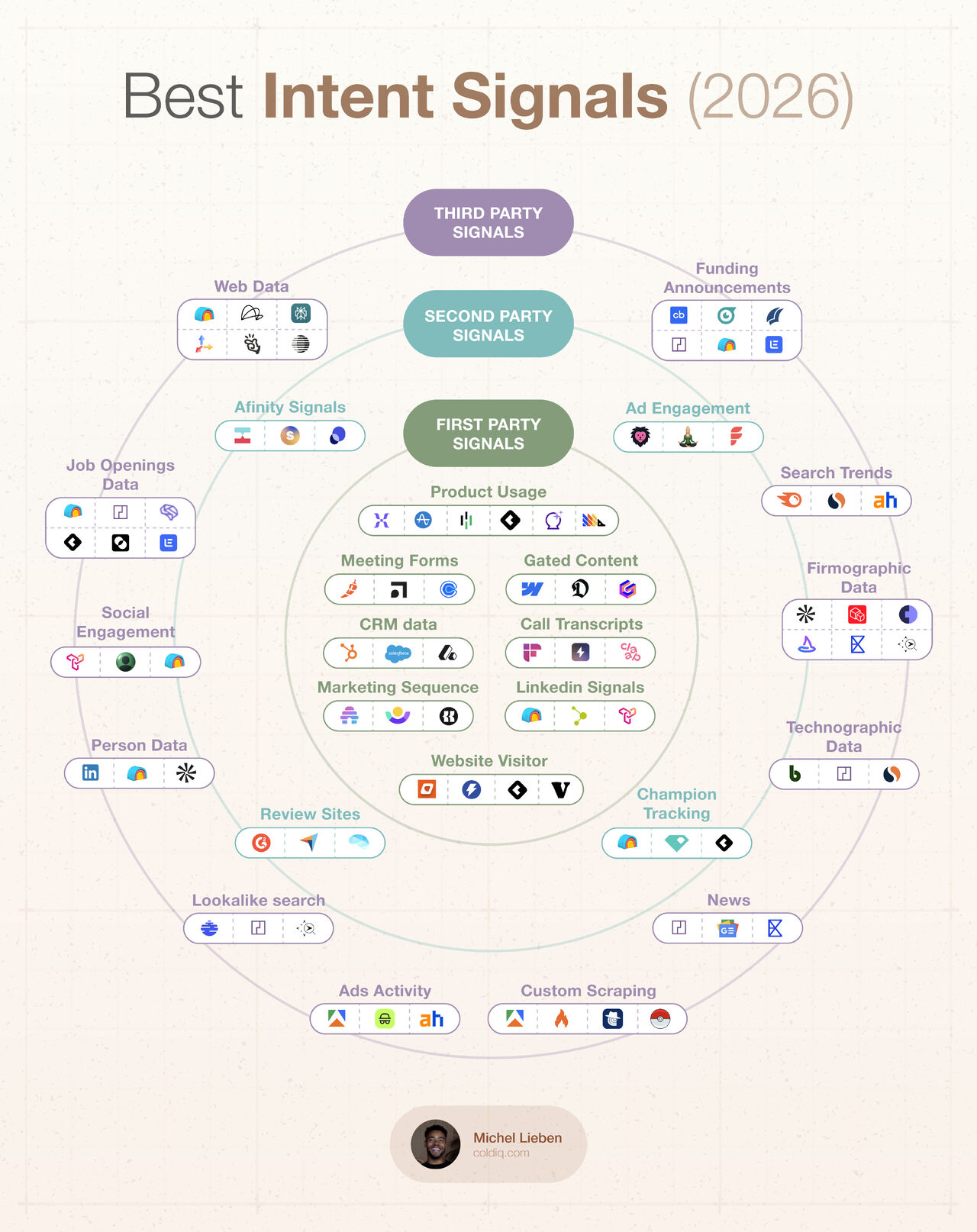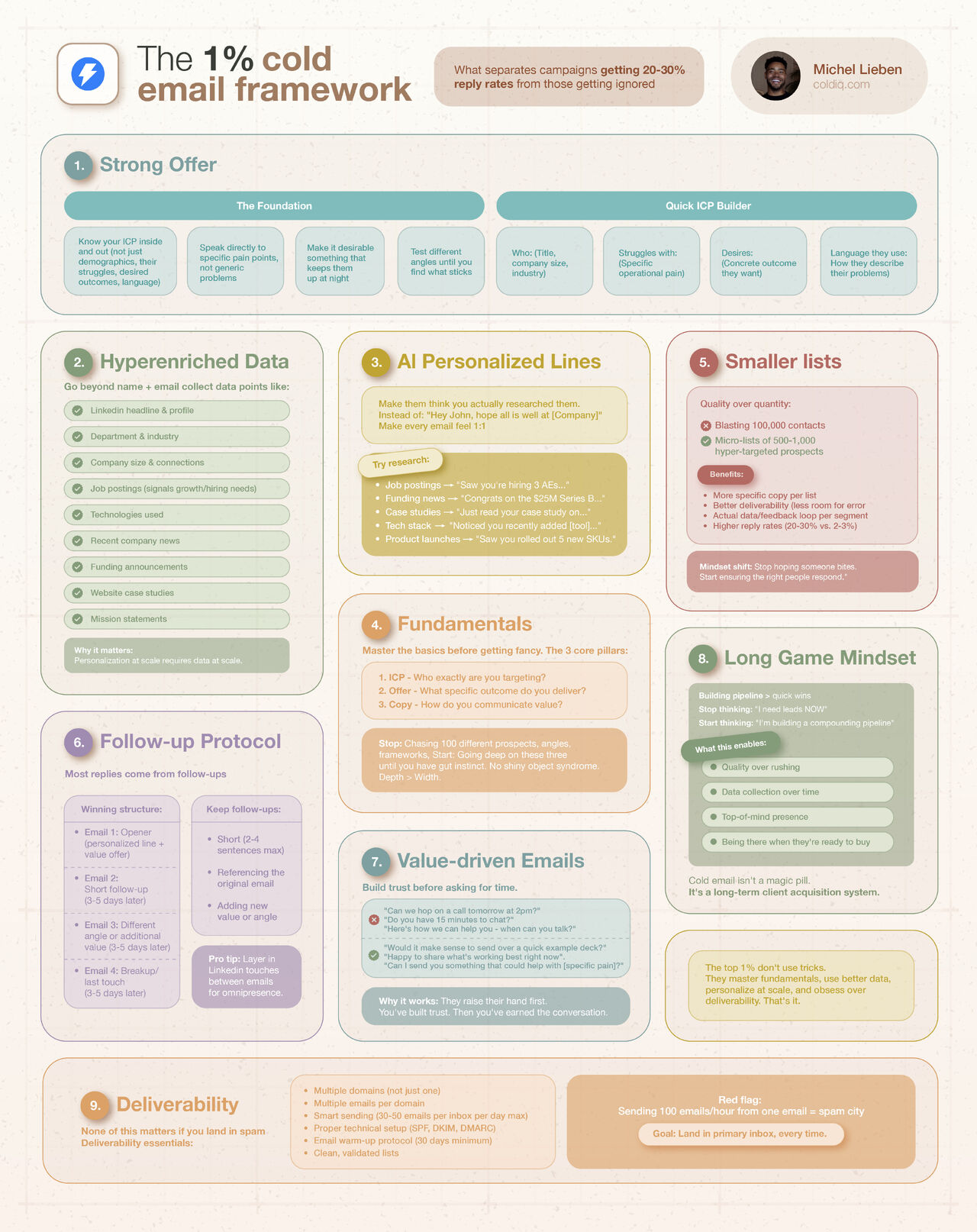AI for Sales Calls: How AI can Enhance Sales Conversations
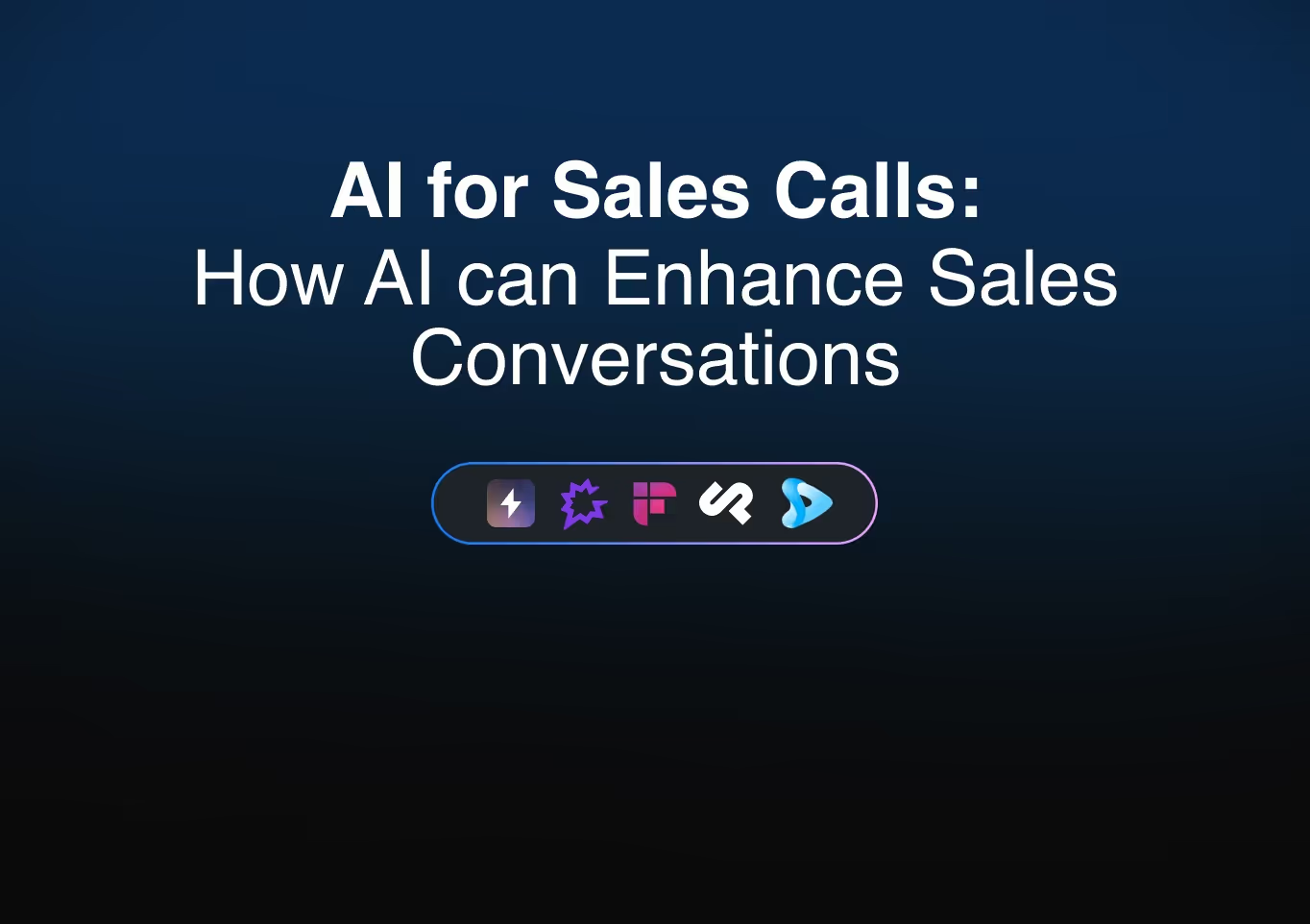
AI for Sales Calls: How AI can Enhance Sales Conversations
As a sales professional, you know sales calls can be exhausting. Dialing prospects and handling objections on the call seems impossible, especially when you try to retain every piece of information from previous conversations. In worse situations, you could communicate with impersonal messages, miss follow-ups, or even lose sales opportunities.
What if there was a way to ease the burden and make the calling process more effective? Enter AI sales calls — the advanced technology sales teams can use to better connect with prospects, seal deals, and maximize revenue. Let’s explore AI sales calls and how you can leverage this new technology to boost your sales efforts.
What is AI for Sales Calls?
AI sales calls or AI cold calling is the use of artificial intelligence technology to enhance sales conversations. Rather than solely relying on human agents to make calls, AI algorithms combine natural language processing (NLP), machine learning, and predictive analytics to optimize call sessions. They analyze customer data and provide data-driven insights to ensure you interact and build relationships with your prospects effectively.
AI sales calling platforms also automate routine tasks like scheduling calls or updating CRMs. This helps to save time and improve productivity. For instance, it can remind you to ask important questions or suggest responses to a customer’s objections, helping to deliver an effective sales pitch.
How AI Enhances Sales Calls
AI-powered tools are revolutionizing sales calls, empowering human sales reps to handle this process better. But how exactly do they improve sales calls? Let’s find out.
1. Automating Task
Repetitive tasks consume time and inhibit your sales team’s productivity. According to HubSpot’s latest sales report, sales reps spend about one hour daily on administrative tasks, wasting time and inhibiting productivity.
However, AI-powered tools can automate routine tasks, saving two hours daily and driving sales efficiency. Whether it’s note-taking, conversation analysis, or CRM updates, they handle tasks that require manual effort, ensuring no essential detail is overlooked.
2. Improved Responses
Traditional cold calling can sometimes feel like throwing darts in the dark, especially when you have to encourage the prospects to convert. However, AI-powered tools analyze thousands of modern sales calls to identify patterns and deliver actionable insights into customers’ needs and preferences upon end.
They provide instant suggestions to keep conversations on track and improve sales teams' responses with 74% of salespeople saying the technology has helped them during warm and cold calls.
Additionally, sales teams predict optimal call times, allowing teams to identify the most promising leads and personalize messages that resonate with prospects. With these insights, you will not only engage customers but also improve customer experience and recover missed sales opportunities at scale.
3. Personalizing Customer Interaction

AI takes personalization to the next level by tailoring every sales call to the individual customer. It starts by analyzing customer data such as past interactions, purchase history, and preferences to provide sales reps with actionable insights before and during the call.
Additionally, AI can suggest custom scripts, product comparisons, or targeted talking points based on the customer’s concerns, ensuring the pitch feels highly relevant rather than generic. Beyond words, AI-driven sentiment analysis detects emotional cues such as tone shifts, pauses, or uncertainty, helping sales reps adjust their messaging accordingly. The impact of personalized interactions makes sales teams move beyond generic pitches and create meaningful connections that drive results.
4. Streamlining Workflows
From call preparation to follow-up, AI ensures every step is efficient and cohesive. These advanced technologies create a smoother workflow for sales teams to eliminate bottlenecks and reduce repetitive tasks. With AI handling these administrative tasks, sales reps can focus on what truly matters: building relationships and closing deals. In short, AI transforms fragmented processes into a streamlined, high-performing system that drives results.
Related: How to Save More Than 10 Hours Weekly with AI Note-Taking Apps
Benefits of Using AI in Sales Calls
Now that you know how AI can enhance sales calls, let’s look at some of its benefits.
1. Note-taking and Transcription
With AI sales tools, sales professionals can devote their time and attention to interacting with prospects, rather than taking notes during meetings. It generates an accurate transcription almost immediately after the call, allowing sales reps to review the conversations and act on the next steps.
Harry Mason, Senior GTM Engineer at ColdIQ says, “We use Attention and Circleback to take meeting notes and compile the data of hundreds of calls. This allows us to see the most common pain points and objections from every call held in the agency.”
2. Elevating Lead Identification and Qualification
AI analyzes customer interactions to identify leads using keywords that indicate conversion potential. It does this at scale to ensure lead qualification and avoid missing out on potential sales opportunities that could convert to customers.
3. Data-Driven Decision
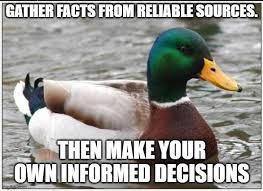
AI transforms sales calls from simple conversations into valuable data sources, enabling sales teams to make smarter, more informed decisions. Every sales call generates critical information, but manually analyzing these interactions is time-consuming and often inconsistent.
As a result, AI examines call transcripts, customer sentiment, and objection patterns to deliver real-time insights, enabling sales teams to adjust their messaging, refine their value propositions, and align their strategies with real customer needs.
4. Automated Follow-ups
After a sales call, sales professionals can send automated follow-up emails to leads based on specific timeframes. This reduces the sales professionals’ administrative duties and allows teams to stay in touch with their prospects.
5. Lead Conversions
With predictive analytics, AI analyzes past interactions, customer behavior, and engagement history, helping sales reps identify leads most likely to convert and engage more effectively. It provides real-time insights that enable sales reps to address objections strategically and guide prospects toward a buying decision.
Overview Table of AI-powered Sales Call Tools
Best AI Tools for Sales Calls
With various AI-powered tools in the market, selecting the best one for your business may be a bit challenging. We reviewed some of the top AI-powered sales tools you can use during sales calls and visited rating sites like G2 to determine their benefits and drawbacks. Let’s dive in!
1. Attention
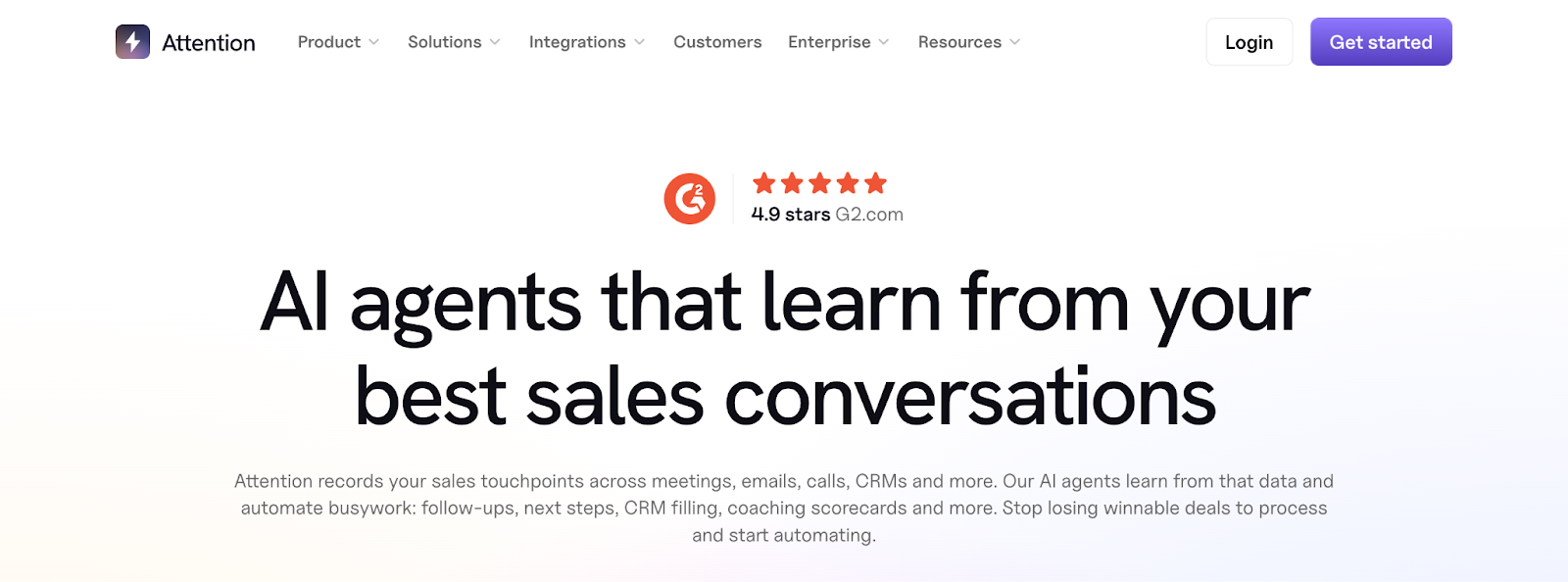
Quick Overview
Attention is an AI-powered sales solution that records live calls and analyzes conversations to boost sales performance. With this platform, sales reps can generate real-time insights and navigate objections on the spot, creating a high-impact conversation.
Top Features
- Call Recordings and Analysis: Attention records and analyzes live conversations, saving sales teams from administrative tasks of manual note-taking.
- Actionable Insights: Attention captures actionable insights from conversations, allowing sales teams to make informed decisions.
- Integrations: Attention integrates with third-party platforms including CRMs, video conferencing platforms, AI-powered solutions, data enrichment platforms, and more.
Pros
- Ease of Use: Attention offers a user-friendly interface, making it accessible to users. Whether it’s call recordings or logging conversations into CRMs automatically, the conversation intelligence platform facilitates smooth interactions that reflect the prospect’s intent and promote quick adoption.
- CRM Integration: Attention auto-updates your CRM with the insights generated from sales conversations, saving valuable time and streamlining your workflow.
- Customer Support: Attention’s customer team is very helpful to users, answering prospects’ questions and any concerns.
Cons
- Missing Features: Users on G2 complain that Attention doesn’t have enough features to address their needs. For instance, it doesn’t have a full mobile app like other providers.
Pricing
Attention’s pricing isn’t available but you can contact them for a quote via their website.
Ratings
Attention is rated 5.0 out of 5 on G2 (17 reviews).
2. Gong

Quick Overview
Popularly known as a conversation intelligence platform, Gong uses AI and machine learning to record sales conversations, analyze, and generate actionable insights for your sales teams. This approach allows them to understand your prospects deeply and improve their overall sales performance.
Top Features
- Call Recording and Transcription: Gong automatically records your team's sales calls on any web conferencing platform and transcribes the recordings. This functionality allows sales teams to search for specific keywords or topics within calls, view call statistics, and highlight areas of interest to improve their overall sales performance.
- Conversation Analysis: With call recording software, Gong’s AI analyzes call data to identify patterns, such as common objections, successful tactics, and areas for improvement. It provides insights into what works and what doesn’t during sales conversations to enhance the team’s performance.
- Real-Time Coaching: Gong provides real-time monitoring capabilities, including action-based triggers and intent signals. During calls, Gong can offer real-time suggestions to help reps navigate conversations more effectively and address challenges promptly.
Pros
- Ease of Use: Gong features an intuitive interface that makes it helpful to users. Whether it’s call recordings or generating notes, users can easily review and analyze past and current conversations for key insights.
- Improved Decision-Making: The conversation intelligence platform detects key moments in conversations, such as objections or buying signals, allowing sales teams to make informed decisions.
- Integrations: It seamlessly integrates with popular CRMs like Salesforce, ensuring all data is automatically logged and accessible.
Cons
- Call Issues: Gong doesn’t show up to some calls, especially the ones you book and begin right away.
- Inaccurate Transcription: Gong generates inaccurate transcriptions of what was said or who said it, which could mislead your decisions.
- Affordability: Gong may not be affordable, especially to some small teams and businesses.
Pricing
The pricing isn’t available on its website. You must request a quote via their website.
Ratings
Gong is rated 4.8 out of 5 on G2 (6,115 reviews).
3. Fireflies
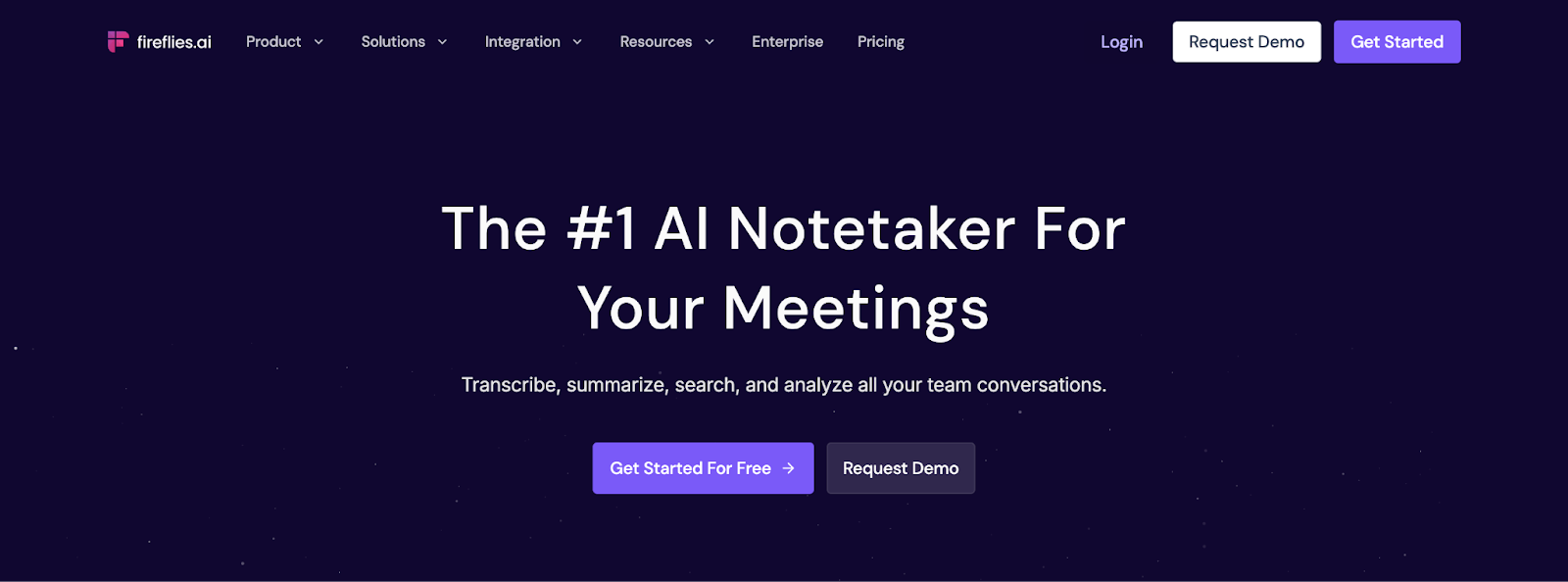
Quick Overview
Fireflies is an AI notetaker that offers a robust solution for recording and transcribing live conversations, generating insightful summaries, and analyzing conversations. It’s useful for reps who want to focus on the conversation without worrying about taking notes.
Top Features
- Automatic Call Recording and Transcription: Fireflies join sales calls (with permission) and automatically record and transcribe the conversation. This ensures no detail is missed, and reps can focus on the discussion rather than taking notes.
- Conversation Analysis: The platform performs sales call analysis to generate customizable summaries and highlight action items you can quickly track for future purposes.
- Collaboration Tools: Users can add comments and flag important moments during calls, facilitating easy review and collaboration among team members
Pros
- Ease of Use: Fireflies is simple to use and configure. It reduces the need for manual documentation with its generated transcripts and summaries, allowing sales professionals to focus more on conversations.
- Improved Collaboration: With Fireflies, sales teams can leave a comment on a script or bookmark action items, facilitating collaboration among participants.
- Integration: The platform integrates with various web conferencing tools, enabling seamless data flow during sales operations.
Cons
- Accuracy Issues: Some users have noted occasional transcription errors, especially with misspelled words, strong accents, or technical terms.
Pricing
Fireflies’ monthly plan starts at $18 per month.
Ratings
Fireflies is rated 4.8 out of 5 on G2 (646 reviews).
4. Cockpit
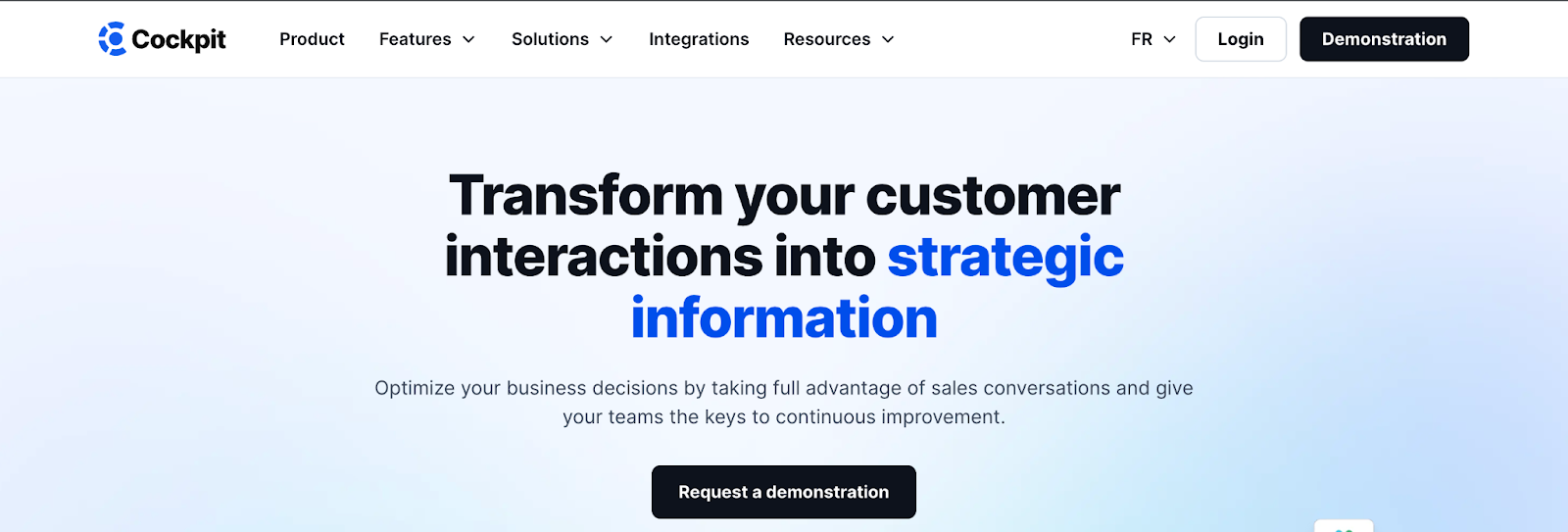
Quick Overview
Cockpit is an AI-powered meeting recording tool that records and analyzes conversations to generate actionable insights. Unlike other tools, it helps to understand customer needs, implement winning strategies, and streamline workflow to enhance sales performance.
Top Features
- Call Recordings and Transcription: Cockpit provides AI-powered recordings and detailed transcription for future reviews.
- AI-Powered Summaries: Cockpit automates your note-taking activities, generating summaries and valuable insights so you can focus on the conversation.
- Conversation Analysis: The conversation intelligence platform analyzes conversations to provide in-depth insights and coaching opportunities for sales teams.
- Integrations: Cockpit integrates with third-party platforms like HubSpot and video conferencing platforms.
Pros
- Ease of Use: Cockpit offers a user-friendly interface that enhances quick adoption by various sales teams.
- Actionable Insights: Thanks to its AI-generated summaries and actionable insights, sales teams can review the necessary details to boost their performance.
- Improved Productivity: Cockpit’s generated insights provide coaching tips for sales reps, boosting their productivity and performance.
Cons
- Missing Features: Cockpit still needs to improve some features to improve its performance.
Pricing
Contact Cockpit’s sales team for a quote.
Rating
Cockpit is rated 5.0 out of 5 on G2 (21 reviews).
5. Sybill
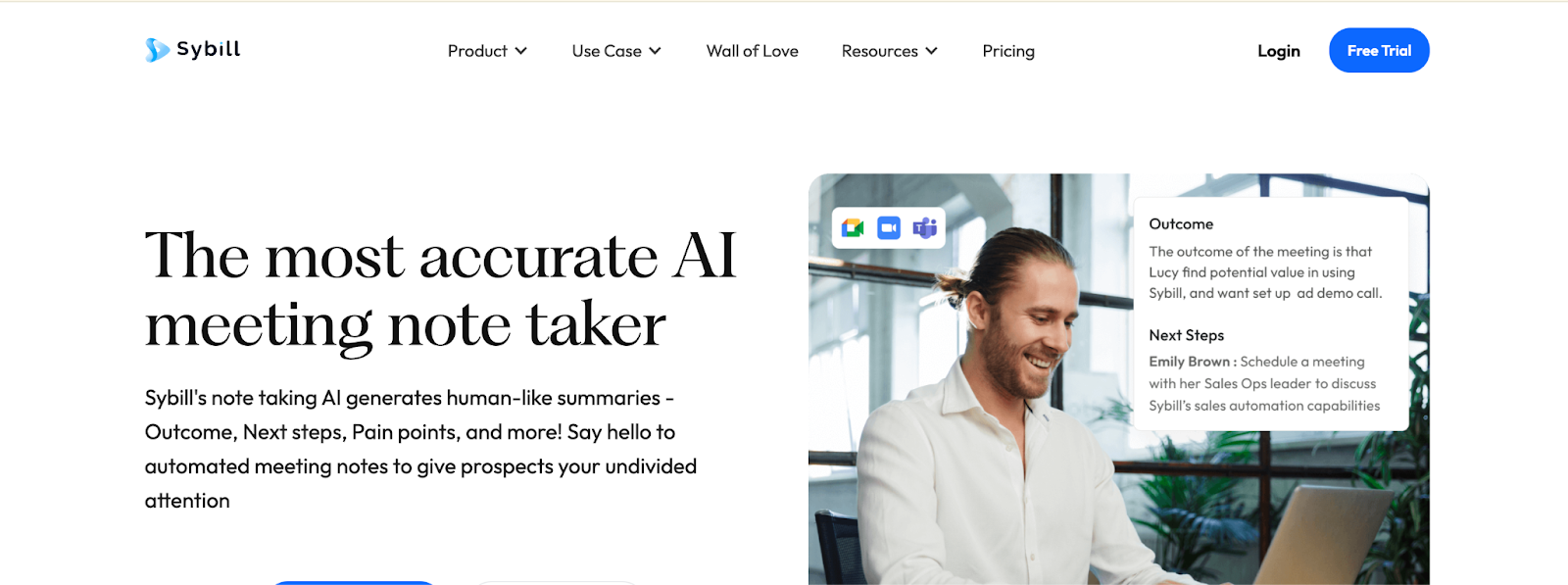
Quick Overview
Our final option on the list is Sybill. The AI notetaker generates meeting notes, crafts human-like summaries, and highlights key points so you can focus on conversations. It also analyzes non-verbal behaviors to add more context to the generated notes and push the information to your CRM.
Top Features
- Note-taking: Whether it’s call transcription, generating summaries, or highlighting key points, Sybill handles these tasks to ensure you give your prospects full attention.
- Integrations: Sybill integrates with third-party platforms such as CRMs, video conferencing platforms, and sales intelligence tools.
Pros
- Ease of Use: Sybill is easy to use and configure. With a few clicks, you can perform your desired task seamlessly.
- Improved Productivity: Sybill’s note-taking features reduce the time spent on administrative duties, allowing teams to focus on more important matters like conversion.
Cons
- Transcription errors: Some users noted that Sybill makes some errors during transcription, especially with misspelled words, or a strong accent.
Pricing
Sybill’s monthly plan starts at $29 per month.
Rating
Sybill is rated 4.8 out of 5 stars on G2 (140 reviews).
How to Implement AI for Sales Calls in Your Team
Implementing AI for sales calls can transform your sales strategy, enabling you to harness its full potential. Let’s discover how to do it.
1. Evaluate Your Needs
Analyze your current sales process and identify the specific needs and challenges you need to solve. Do you need a tool to take notes? Analyze conversations to generate actionable insights. Generate automated follow-ups? Or schedule meetings? Pinpointing these issues helps determine where the AI-powered platform will make the most impact.
2. Choose the Right AI Solution
There are many AI tools for sales calls in the market, like Retell AI and its alternatives, each having its strengths and weaknesses. Consider if the tool solves your immediate problems, identifies objections, and offers proactive actions.
You should also look out for factors like:
- User-friendliness: Is the tool’s user interface intuitive? Can your team easily adapt and configure the tool?
- Integrations: Does it integrate seamlessly with your existing workflows and systems?
- Pricing: Is it budget-friendly?
- Scalability: Is it a tool that can adapt to future needs?
- Reviews: Have other users mentioned positive comments about the tool?
Considering these factors ensures a smooth adoption process and maximizes the tool’s impact.
3. Lead and Train Your Team
AI adoption isn’t only about the technology; you also need the people to maximize its potential. As a sales leader, showcase your expertise during sales conversations to your team members. Anis Bennaceur, Co-founder and CEO of Attention says, “Every B2B CEO should cold call even if you have several SDRs. Leading by example shows your reps that you can do it too. They will get more comfortable doing it too.”
Also, train your team by demonstrating how to use the tool effectively. Organize hands-on training sessions that walk reps through the tool’s features and functionalities. Show them how AI can simplify their tasks, such as automating call transcriptions, generating personalized scripts, or providing real-time insights during calls.
This practical approach helps reps understand how to leverage the tool effectively. Continuous training is essential to update your team with new features and implement best practices.
4. Measure and Optimize AI’s Impact on Sales Calls
Measure the AI’s impact on sales calls to track what’s working or falling short. Review key performance metrics such as conversion rates, talk-to-listen ratios, objection handling success, and follow-up efficiency. This approach reveals trends in call success rates and overall efficiency.
Also, compare the AI tool’s performance to that of human reps. You may discover that human reps should handle certain functions. For instance, analyze how your AI cold calling tool leads to new leads and sales, and compare the result to when humans handle the process. Determine the one that performs which function best and optimize for continuous use.
Challenges of Using AI in Sales Calls and How to Overcome Them
While AI offers lots of benefits to sales calls, it also has some drawbacks. Here are some challenges of using AI in sales calls:
1. Inaccurate Data

AI cold-calling tools can make errors while generating transcripts for their users. For instance, it could miss the contextual message during a conversation or fail to analyze the prospect’s tone or sentiment properly. This can generate inaccurate data and mislead your sales representatives.
As a result, it’s essential to use your AI cold-calling tool as a guide rather than a definitive answer. Sales reps should also balance AI insights with their own expertise, trusting their instincts and adapting strategies based on real-time interactions. This ensures they remain flexible and responsive to unique customer situations.
2. Difficulty in Handling Complex Objections
AI often struggles to handle complex or unexpected objections during sales calls. A KPMG study highlights that the sole use of AI during interactions leaves customers underwhelmed and frustrated when they desire human contact. In other words, these AI cold-calling tools may falter when faced with highly specific questions or objections. This can leave your prospects frustrated and your sales reps unprepared to counter objections effectively..
To overcome this, sales reps should use AI to identify common objections and prepare standard responses but also invest time in honing their problem-solving and communication skills.
3. Integration with Existing Tools
Many sales reps find it difficult to seamlessly incorporate AI into their daily routines, leading to inefficiencies and frustration. Poor integration can also result in difficulties in data transfer, limiting the effectiveness of AI.
To tackle this, companies should invest in AI solutions that are compatible with their current tools and provide adequate training to sales teams. Ensuring smooth integration and offering ongoing support can help reps fully leverage AI’s capabilities, and streamline their workflows.
Future Trends in AI Sales Calls
As AI continues to evolve, its role in sales calls is expected to become even more transformative. The future of AI in sales calls will focus on deeper personalization, proactive insights, and seamless integration across channels.
1. Hyper-Personalization with Advanced NLP
Future AI systems will leverage advanced natural language processing (NLP) to achieve hyper-personalization. Not just what prospects say but also their tone, sentiment, and context, AI will enable sales reps to tailor their messaging with good analysis. This will create more meaningful and emotionally resonant conversations, leading to stronger relationships and higher conversion rates.
2. Predictive Analytics for Proactive Selling
AI will increasingly use predictive analytics to forecast customer preferences and needs before they are explicitly expressed. With actionable insights, sales reps can proactively address concerns, suggest solutions, and predicate future buying behavior. This approach provides sales agents with a significant competitive advantage over their competitors.
3. AI-Driven Role-Playing and Training
AI will play a larger role in sales training by simulating realistic sales scenarios for reps to practice. These AI-driven role-playing exercises will provide instant feedback on performance, helping reps refine their skills and build confidence. Over time, this will lead to more polished and effective sales calls, driving better results.
4. Seamless Multichannel Integration
Future AI tools will seamlessly integrate across multiple communication channels, such as email, chat, and social media, to provide a unified view of customer interactions. This will enable sales reps to maintain consistent and context-aware conversations, regardless of the platform. By breaking down data silos, AI will ensure a smoother and more cohesive sales process.
How ColdIQ Enhances Sales Calls for Better Conversions
It's no longer news that AI transforms how businesses approach sales calls. Whether it’s the ability to analyze data or personalize scripts, take notes, and enhance sales performance, AI sales calls are essential to make businesses thrive in the current sales landscape. By implementing the right tools and strategies, your business can maximize the full potential of these tools to effectively engage with prospects and achieve better results.
ColdIQ remains the best outbound lead generation agency to achieve better conversions. With various AI sales tools, our experts revolutionize the sales process to ensure you achieve the best result. Book a demo today to experience how ColdIQ’s AI-driven solutions can enhance your sales calls, take your team’s performance to the next level, and drive better conversions.
FAQs about AI for Sales Calls
1. How does AI improve sales calls?
AI improves sales calls by providing personalized insights, real-time coaching, and data-driven strategies to enhance engagement, handle objections, and increase conversion rates.
2. Can AI provide real-time coaching during sales calls?
Yes, AI can offer real-time coaching by analyzing conversations, suggesting responses, and guiding reps to address objections and highlight key points effectively.
3. What are the best AI tools for analyzing sales calls?
The ultimate AI tool for analyzing sales calls depends on your specific needs and overall business objectives. However, you can consider AI tools like Attention, Gong, Cockpit, Sybill, and Fireflies to analyze your sales calls.
FAQ
AI works best for high-volume and repetitive calls, such as cold outreach and follow-ups. Complex negotiations still require human insight, but AI can provide initial data and suggestions that prepare reps for deeper conversations.
AI offers data analysis, conversation insights, and task automation to assist salespeople. However, final decisions and personalized communication remain the responsibility of the sales rep, ensuring a balanced human-AI partnership.
How frequently should sales teams review AI tool performance?
Can AI identify emotional cues during sales calls?
Let's Get Started!
Schedule a 30-minute call with ColdIQ leadership to learn how our outbound strategy and sales tools help generate qualified leads and close deals.
.avif)
.svg)
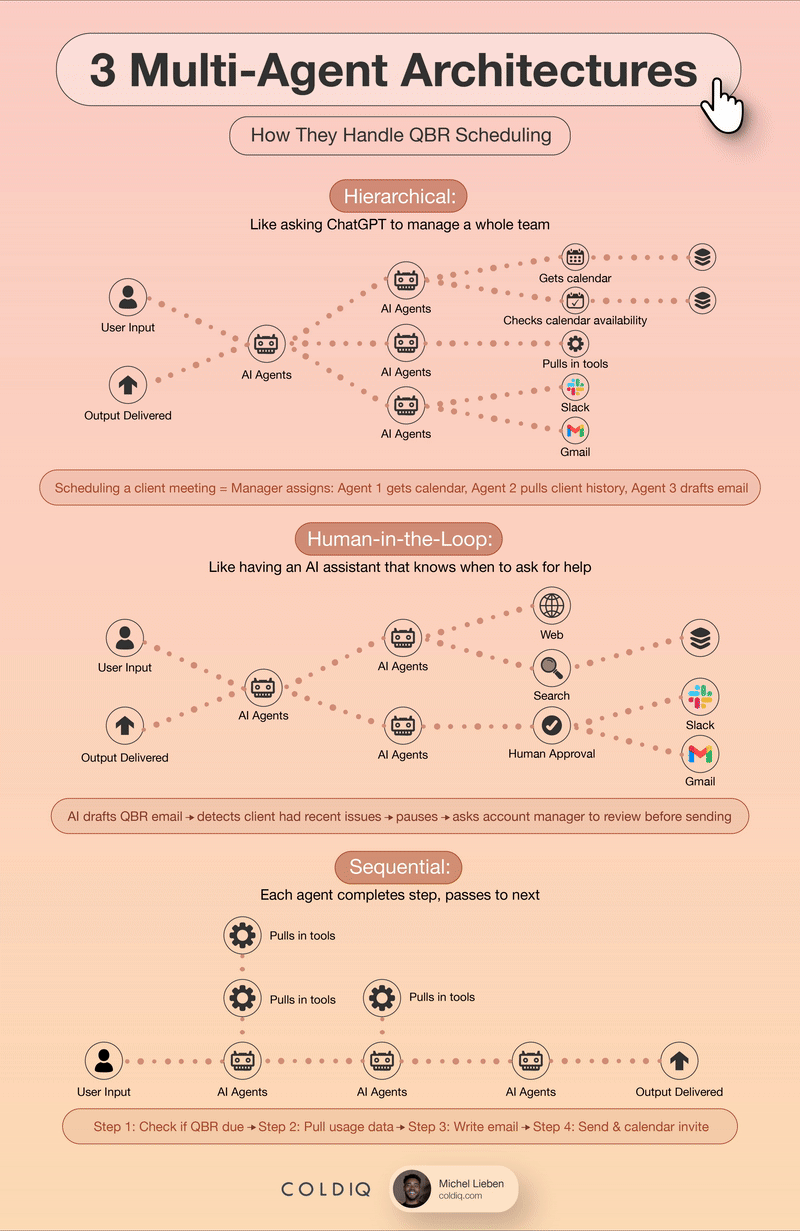
.jpg)

